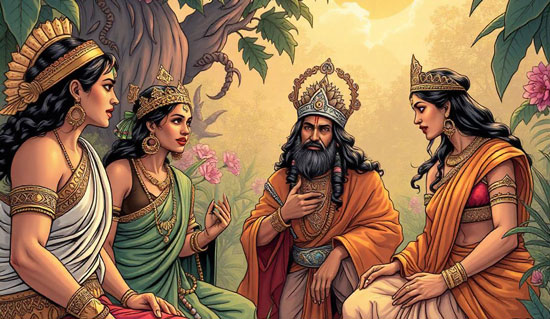Spiritual Journey of King Gunshekhar
Explore how Abhaichand, the Jain minister, influenced King Gunshekhar to abandon idol worship, and the moral lessons behind his strict laws.
Poignant Tale of King Gunshekhar's Reign
The 10th Tale of Betal Pachisi
The spirit said, "O king! in the country of Gaur there is a city called Baradman, and the king of that place was named Gunshekhar. His minister was a follower of the Jain persuasion, Abhaichand by name. Through his persuasion, the king, too, entered the pale of the Jain religion. He prohibited the worship of Shiva, as also that of Vishnu, and offerings of cattle, grants of land, oblations1 to deceased ancestors, gambling and intoxicating liquors—all these he interdicted: no one was allowed to practice them in the city, and no one could carry away bones to the Ganges. And the minister, too, with the king's sanction for these matters, had it proclaimed in the city, that whoever performs these acts, the king will confiscate all his property, and inflict punishment on him, and expel him from the city."
"Thereafter the minister said one day to the king, 'Attend, O king! to an exposition of the sacred law Whosoever takes the life of any one, this same takes his life also in another state of existence. It is on account of this sin that living and dying are inseparable from man on his entering this world. He is born again and again, and again he dies. Hence, it behoves man, on his being born into the world, to treasure up virtuous deeds. Observe (how) Brahma, Yishnu, Mahadeva, in one form or another, become incarnate in the world under the influence of love, anger, covetousness, or infatuation! A cow, forsooth, is superior to them, for she is free from passion, hatred, pride, anger, covetousness, infatuation; moreover, she sustains the subjects. And the sons which are born to her also impart the utmost ease to the living things of the earth, and cherish them. It is for this reason that all the deities and holy sages hold the cow sacred. Therefore, to worship the gods, is not well: worship the cow in this world. And it is a duty to protect the life of every animal, from the elephant to the ant; including beasts, birds, &c., up to man; there is no duty equal to that in the world. Those who add to their flesh by eating the flesh of other creatures, ultimately suffer the torments of hell. Hence it is incumbent on man to preserve life. Those who regard not the sufferings of others, but go on destroying the life of other creatures, and eating them—their lives are shortened on the earth, and they are born cripples, or lame, or blind of one eye, or blind of both eyes, or dwarfs, or hunch-backed, or with some such bodily defect. According to the limbs of beasts and birds which they devour, they eventually lose similar members of their own. Further, the drinking of intoxicating liquors is a great sin. Hence the consumption of flesh and intoxicating drinks is not right.'"
"Thus unfolding to the king the wisdom stored up in his mind, the minister made him so sound a convert to the Jain faith, that whatever he advised the king did; and he paid no respect to any Brahman, ascetic, itinerant devotee, or religious mendicant;2 and governed his kingdom according to this religion. One day, coming under the power of death, he died. Thereupon his son, Dharm-dhwaj by name, ascended the throne, and began to reign. One day, having had the minister, Abhaichand, seized, and seven plaits made of the hair on his head, and his face blackened, and (the minister) himself seated on a donkey, and a drum beaten and hands clapped (in derision) after him, he then banished him from the kingdom, and carried on his government free from all anxiety."
"One day, in the spring-time, the king, accompanied by his queens, went to take a stroll in a garden. There was a large tank in that garden, and the lotus was in full bloom therein. On beholding the beauty of the tank, the king stripped off his clothes, and went down to bathe. Having plucked a flower, and come to the side, he was handing it to one of the queens, when it slipped from his hand and fell on the queen's foot; and by the blow it inflicted the queen's foot was broken. On this the king became alarmed, and forthwith coming out from the tank, began applying remedies; and in the meantime, night came on, and the moon shone forth. No sooner did the moon's beams fall, than blisters arose on the body of the second queen. Farther, just then the sound of a wooden pestle from some householder's suddenly reached the third queen, and she was instantly attacked with so severe a headache, that she fainted away."

After narrating so much, the spirit said, "O king! which of these three was the most delicate?" The king replied, "The one who got the pain in the head and fainted away, she was the most delicate." On hearing these words, the spirit again went and suspended himself on that tree; and the king went there and took him down, and, making a bundle of him, placed him on his shoulder, and walked off with him.
Try out the other sections

 Craft Ideas for Kids
Craft Ideas for Kids Rhymes & Poems
Rhymes & Poems Benefits of Yoga for Kids
Benefits of Yoga for Kids School Projects & Homework Help
School Projects & Homework Help